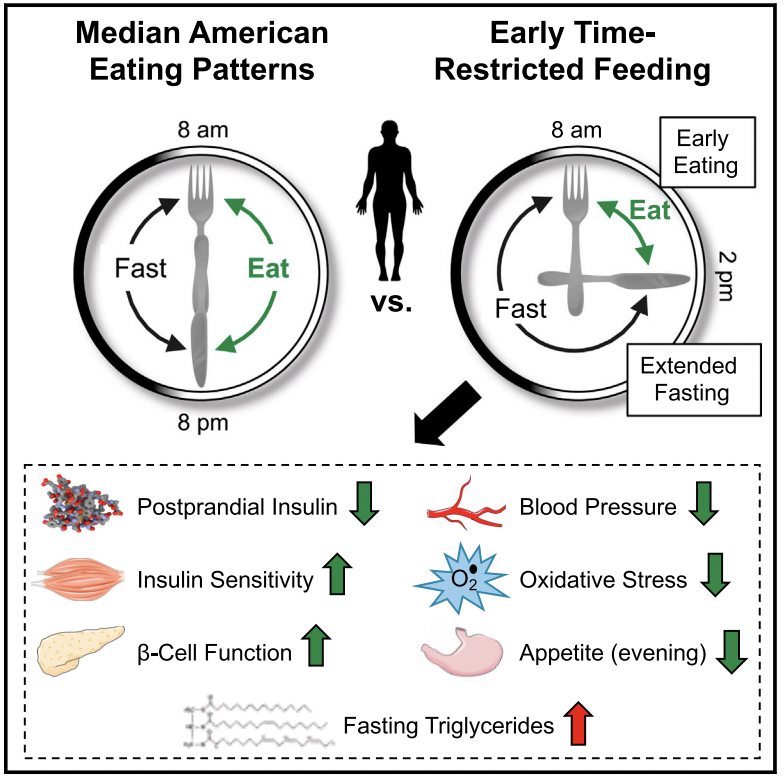In this article:
First: what is Intermittent Fasting
Intermittent fasting (IF) is a way of eating that alternates between periods of eating and fasting. Unlike traditional diets that focus on what and how much you eat, IF focuses on when you eat. A popular method is the 16/8 method, where you fast for 16 hours (for example, from 9 p.m. to 1 p.m.) and eat during an 8-hour window (from 1 p.m. to 9 p.m.). With IF, you don’t have to eat less overall; you just skip meals during the fasting periods.
Traditionally, many people believed that the benefits of intermittent fasting (IF) were simply due to eating fewer calories. However, a new study suggest the opposite: that IF offers unique health benefits beyond just reducing calorie intake.

The 2018 Study: Early Time-Restricted Feeding, or eTRF
A groundbreaking 2018 study titled “Early Time-Restricted Feeding Improves Insulin Sensitivity, Blood Pressure, and Oxidative Stress Even Without Weight Loss in Men with Prediabetes” explored the effects of a specific form of intermittent fasting known as early time-restricted feeding (eTRF). This method involves consuming all meals within a 6-hour window, with dinner before 3 p.m.
What is cool about this study was that all the partipant were given exactly the amount of calories needed to keep their weight. Not lose weight, not gain weight.
Traditionally, many people believed that the benefits of intermittent fasting (IF) were simply due to eating fewer calories. They thought that a regular calorie-restricted diet would provide the same advantages because the benefits were assumed to come solely from weight loss. However, this study suggest the opposite: that IF offers unique health benefits beyond just reducing calorie intake.
Men with prediabetes were randomized to eTRF (a 6-hour feeding period, with dinner before 3 p.m.) or a control schedule (a 12-hour feeding period, allowing them to eat from 9 a.m. to 9 p.m.) for five weeks. At the end of the 5-week period, the eTRF group showed much more promising results than the control group. The participants were then switched: the eTRF group became the control group, and the control group started fasting. After 5 weeks, the new eTRF group showed the same improvements as the previous one, further proving the benefits of intermittent fasting.
Key Findings
The study revealed several significant health benefits of eTRF, even without weight loss:
- Improved Insulin Sensitivity: Participants showed enhanced insulin sensitivity, which is crucial for managing blood sugar levels and reducing the risk of type 2 diabetes.
- Lower Blood Pressure: eTRF was associated with a reduction in blood pressure, contributing to better cardiovascular health.
- Reduced Oxidative Stress: The study found a decrease in oxidative stress markers, indicating a lower risk of chronic diseases and improved overall cellular health.
- Appetite Regulation: Participants reported a reduced desire to eat in the evening, which can help in managing overall caloric intake and preventing overeating.
Beat Oxidative Stress, Boost Your Health!
Reducing oxidative stress has many benefits:
- Healthier Cells: Cells are the key components, the smallest “bricks” of your body, brain, and mind. They are what make you “alive” and either resilient or weak. Reducing oxidative stress will keep your cells—and the key components of them, such as proteins and DNA—in good shape, preventing damage.
- Slower Aging: Reducing oxidative stress slows down the breakdown of collagen, which is essential for keeping your skin, joints, muscles, and blood vessels healthy and youthful.
- Better Heart Health: It lowers the risk of heart diseases by protecting your blood vessels.
- Improved Diabetes Management and Energy Use: It helps your body use insulin better, improves your ability to burn more energy, and helps you maintain a healthy weight and body composition, even without dieting or exercising.
- Brain Protection: Antioxidants protect your brain cells, lowering the risk of diseases like Alzheimer’s.
- Cancer Prevention: By preventing DNA damage, it reduces the risk of cancer.
Incorporating a diet rich in antioxidants (like fruits, vegetables, nuts, and seeds), avoiding smoking, reducing exposure to pollution, and managing stress were once thought to be the only tools we had to reduce oxidative stress and slow down the aging process, as well as the appearance of age-related illnesses such as Alzheimer’s and other brain diseases, high blood pressure, diabetes, obesity, IBS, rheumatoid arthritis, and more. Now, we know that we have another tool in our arsenal: eTRF (early morning time-restricted feeding).
Conclusion: Practical Tips for Intermittent Fasting and eTRF
While the benefits of intermittent fasting, particularly eTRF, are compelling, it’s essential to approach it with balance. Continuous daily fasting can lead to metabolic adaptation, where the body slows down its metabolism to conserve energy. Essentially, if you do it too often and for too long, you might end up not only losing the benefits of intermittent fasting but also becoming more prone to gaining weight. To avoid this, consider incorporating intermittent fasting only a few days a week, with a 4-6 hour eating window. This approach can provide significant health benefits without drastically altering your total caloric intake, as long as you maintain a healthy diet.
While the benefits of intermittent fasting, particularly eTRF, are compelling, it’s essential to approach it with balance. Continuous daily fasting can lead to metabolic adaptation, where the body slows down its metabolism to conserve energy5. Essential, if you do it too often and for too long, you miche end up not only losing the benefits of IF, but even become more prone to gaining weight. To avoid this, consider incorporating intermittent fasting only few days a week, with a 4-6 hour eating window. This approach can provide significant health benefits without drastically altering your total caloric intake, as long as you maintain a healthy diet.
Intermittent fasting, especially when done correctly, can be a powerful tool for improving health and well-being. Always consult with a healthcare provider before making significant changes to your eating patterns.
By understanding and applying the principles of intermittent fasting, you can harness its benefits to enhance your health, even without weight loss. Happy fasting!
For more tips on maintaining health and youthfulness at any age, explore our comprehensive article:
The 10 most efficient, scientifically proven habits to stay young and fit at any age
References:
- Bupa UK. “How does age affect a man’s sexual health?” Retrieved from Bupa UK
- NHS. “Sleep problems – Every Mind Matters.” Retrieved from NHS
- Healthline. “Low Testosterone (Low T): Symptoms, Causes, and More.” Retrieved from Healthline
- Medical News Today. “Sleep deprivation: Causes, symptoms, and treatment.” Retrieved from Medical News Today
Disclaimer
Consult a health professional before making significant changes to your diet, exercise routine, or supplement regimen. The information provided in this blog is intended to convey the latest scientific research in an accessible manner. However, it does not replace the advice of a medical professional. Take your health conditions into account and consult a qualified healthcare provider to ensure that the decisions you make are safe and appropriate for your specific health needs. Ultimately, you are responsible for your own health and well-being.





